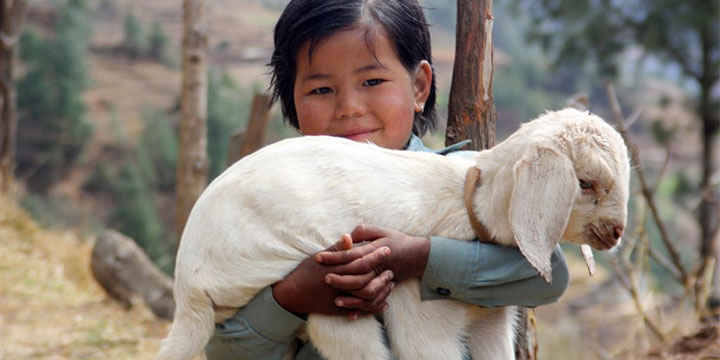Based on GDP per capita Nepal is ranked as one of the poorest countries in the world. In 2015 a massive earthquake struck the region of Listikot, affecting vulnerable families living in the area. Three of those families – The Tamang, the Ganesh Bishwakarma and the Shomati Bishwakarma families were badly affected by the earthquake. Their homes were destroyed and their livelihood – gone. Their lives became even more challenging.
The tight knit family of Tamang were left with almost nothing. They had to slowly rebuild a smaller home consisting of only one room using stone and metal. Life became challenging with insufficient land to grow food on for the whole family of nine. The family’s livelihood was gone and they were left with almost nothing. Family members undertake casual work whenever they can find it earning on average £4 per day to feed an extended family of nine.
The Ganesh Bishwakarma family – like many families, were devastated by the earthquake. Their house was destroyed and proved impossible to rebuild. They live in a temporary structure made of stone, metal and plastic sheeting. With no land to grow food on, their only income is from sporadic construction work which generates £4 per day. Their dream is also to be self-sufficient and for their youngest son to finish his education.
The Shomati Bishakarma family were also severely affected by the earthquake. Having lost her husband in the earthquake, Shomati had to provide for her sister and four daughters. Despite feeling like her life had ended with the death of her husband, she knew she must carry on – her children and sister were dependent on her. The family lived in a metal sheeting structure, had no income and no obvious way to survive. Shamati and her sister found work as casual labourers and were able to earn just enough to meet their basic needs.
With the help of village elders, the three vulnerable families living in Listikot were chosen to receive vital economic uplift.
Thanks to the generosity of Kortext and CEO James Gray, the families were each offered to start a goat rearing businesses. The rationale being that goats are a high value, low maintenance, sacred animal which command high prices all year round particularly during religious festivals.
The idea for the project came about as a result of a training event held for the senior team at Kortext. The team was set a challenge of coming up with a theoretical solution to uplift a rural family in Nepal. This challenge, which took one hour to complete, turned a theoretical exercise into reality which improved the lives of the three Nepalese families affected by the earthquake.
As a result, the families have been able to create a sustainable livelihood for themselves, restoring hope, independence, dignity, and self-esteem.







